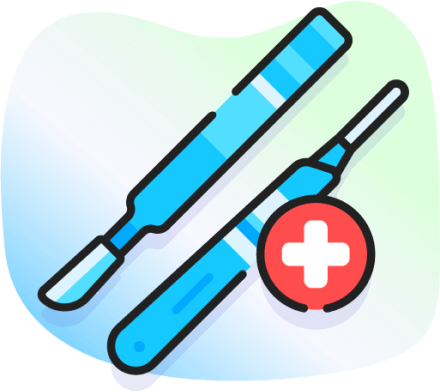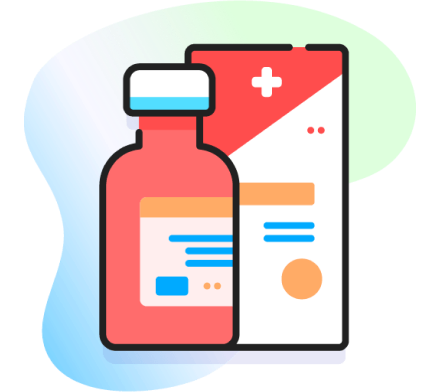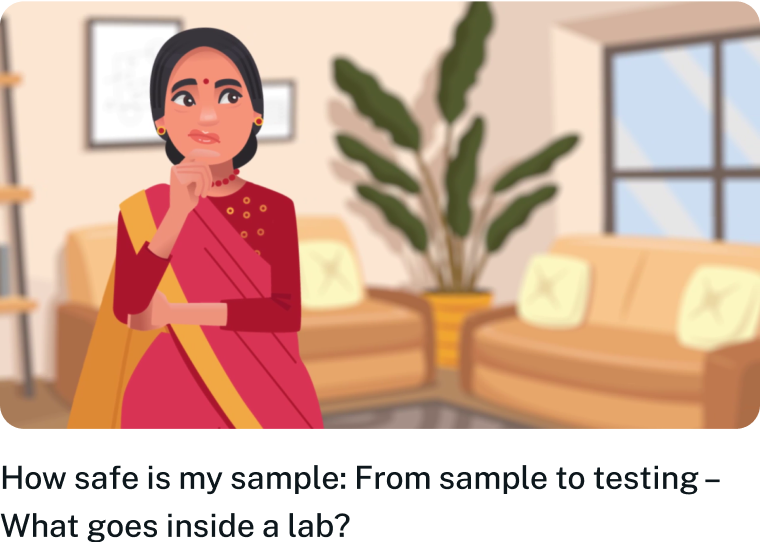Common Hospital Risks
Infections To Be Aware Of
Infections are amongst the most common occurrences during hospitalisations. Since patient immunity is low during a health crisis, it is important to be aware of common hospital-acquired infections that your loved ones can suffer from.
Pneumonia
Pertains to the lungs being filled with fluids, hospital-acquired pneumonia is an infection that you can get from non sanitised hands, clothes and other instruments.
Urinary tract infections (UTIs)
An infection along the urinary tract is called a urinary tract infection. It can cause minor/major discomfort and frequent urination.
Surgical Site Infections (SSIs)
Mostly related to post-surgical care, these infections occur after major/minor surgeries.
Clostridium Difficile Infections (CDIs)
These are infections that spread through infected surfaces, poor hygiene or equipment.
Central Line-associated bloodstream infections
These are laboratory-confirmed bloodstream infections that are not related to an infection at site.
Sepsis
Sepsis is a life-threatening condition. In layman terms, it’s your body's extreme response to an infection.

Misplacing Surgical Equipments
There are incidents where doctors have forgotten scissors, scalpels etc in patients. This usually occurs when there’s a sudden change in the course of surgery.

Insufficient Anaesthesia
It’s a common error during procedures, where doctors anticipate a lesser quantity and patients start waking up faster than expected.

Timely Treatment
Delays in any medical emergency can be fatal. Therefore, time is of the essence, especially in cases related to the heart, brain, and excessive blood loss.

Unnecessary Tests & Drugs
Both these can be frustrating for families and the latter can cause complications. Sometimes hospitals prescribe unnecessary tests to inflate bills.
Common Medical Errors
It’s important to be clear with your doctors, so as to help them avoid common medical errors. Before opting for surgery, ensure that you have taken second and third opinions from trusted sources.
Be mindful of Misdiagnosis
Due to resource limitations and overlapping symptoms, some conditions are often commonly misdiagnosed. If you’re concerned about being misdiagnosed, seek a second opinion.
Cases of misdiagnosis include:
Tuberculosis (TB)
TB is a lung infection and it can sometimes be mistaken for lung cancer. This can lead to delays in getting the proper treatment for cancer.
Migraines
Migraines are severe headaches that can cause debilitating symptoms. They are often misdiagnosed as sinus headaches or tension headaches.
Mental health conditions
The lack of awareness about mental health, makes it difficult to diagnose these conditions correctly.
Patient Safety Practices
Questions to Ask Your Doctor
It’s better to be safe than sorry. There is no such thing as too many questions when it comes to medical emergencies. Here’s a list of what you should be asking.
- What’s the diagnosis? Can you explain it in layman terms?
- What are my treatment options? Their benefits and risks?
- What are the potential side effects of each treatment? Likelihood of success?
- What are some lifestyle changes I can make to improve my health?
Preparation for your Stay
Hospitalisation can be a cumbersome and expensive process. Here are some key aspects to consider.
- Gather information and go informed: Understand the purpose for your hospital stay, including any planned procedures or tests.
- Inquire about the expected duration of your stay and discharge process.
- Prepare medical documents: Pack all relevant, historical and updated medications.
Here are some steps you can take to reduce risk during hospitalisation:
Understand your procedure: Ask your doctor detailed questions about the planned procedure, potential risks and complications.
Hygiene:Ask visitors to do the same and sanitise frequently.
Pain Management: Communicate openly with your doctor and nurses about pain levels to ensure proper pain management.
Review your medications with your doctor to ensure they won't interfere with hospital-administered medications
If possible, get out of bed and move around as much as your doctor allows to improve circulation and prevent blood clots
Understanding Patient Rights
Patients today are armed with a set of well-defined rights that empower them to make informed decisions. Here are legal rights that you should be aware of.
Right to Information
You have the right to be informed about your illness, diagnosis, and treatment options in a clear and understandable manner.
Right to Records and Reports
You have the right to access your medical records, including test results, prescriptions, and doctor's notes.
Right to Informed Consent
Right to give informed consent means the doctor must explain the risks, benefits, and potential alternatives and obtain your written consent before proceeding.
Right to Transparency in Rates
You have the right to be informed about the costs associated with your treatment upfront. Most hospitals are obligated to display charges at the reception.
Right to Second Opinion
You have the right to seek a second opinion from another doctor. Hospitals have to facilitate this by providing your medical records without any delay or extra charges
Right to Safety and Quality Care
You have the right to expect safe and quality healthcare services that adhere to established medical standards. Hospitals should have qualified staff and proper facilities to ensure patient safety.
Right to Emergency Medical Care
You have the right to receive emergency medical care at any government hospital. Hospitals cannot deny you basic treatment during a critical situation.
Video Gallery



Financial Strategy
Understanding Payment, Insurances & Remunerations
Hospital payment plans can vary depending on the type of hospital (public vs private) and your insurance situation. Government hospitals are often inexpensive, while the private healthcare system is expensive.
Understanding your bill:
It’s crucial to understand the breakdown of your hospital bill. This may include:
- Room charges
- Doctor’s fees
- Surgeon’s fees (if applicable)
- Cost of medications
- Charges for tests and procedures
- Other miscellaneous charges
Tips for Managing Bills
- Talk to the hospital: Before admission, inquire about estimated costs and payment options. Most hospitals are today obligated to display room charges at the reception. Hospitals should provide a clear breakdown of these expenses.
- Explore insurance coverage: Understand your health insurance plan’s coverage for hospitalisation, including cashless options and limitations.
- Consider government schemes: If you’re eligible for government health insurance schemes, explore their benefits to reduce costs.
Medical Insurance & Claims
Medical insurance acts like a financial shield that protects you from the high costs of hospitalisation. It’s important to understand the system, what it covers and how to use it.
Sum Insured
The maximum amount the insurance company will pay for your medical expenses during a policy period (usually one year). Choose a sum insured that adequately covers hospitalisation costs in your city.
Deductible
An optional feature where you pay a specific amount upfront before the insurance company starts covering your expenses. This can help reduce your premium.
Room Rent Limits
A set limit on the daily room charges covered by the insurance. This might not cover luxury suite charges
Network Hospitals
Hospitals with which your insurance company has tie-up agreements for cashless hospitalisation. Opt for a plan with a wide network.
Understanding Claims -
Cashless vs. Reimbursement
Cashless
This is the most convenient option. In a network hospital, the insurance company settles the bill directly with the hospital within policy limits. You only pay for extra charges exceeding your coverage.

Reimbursement
You pay the hospital bill upfront and then claim reimbursement from your insurance company by submitting required documents like bills, prescriptions, and discharge summary.
Sales Growth.
Our clients describe us as a product team which creates amazing UI/UX experiences, by crafting top-notch user experience of funny the century rather.
00%
Increased by
the last 2 years.
Choose a Service Plan.
Our clients describe us as a product team which creates amazing UI/UX experiences, by crafting top-notch user experience of funny the century rather.
Personal
- Core business process revision;
- Team management;
- Custom infrastructure;
- Custom design & features.
Corporate
- Core business process revision;
- Team management;
- Custom infrastructure;
- Custom design & features.
Frequently Asked
Questions.
How does the 14-day trial work?
When our team provides design and digital marketing. Applied arts can include industrial design, graphic design, fashion design. The app provides design and digital marketing.
How do I pay for your service?
When our team provides design and digital marketing. Applied arts can include industrial design, graphic design, fashion design. The app provides design and digital marketing.
How can I cancel my subscription?
When our team provides design and digital marketing. Applied arts can include industrial design, graphic design, fashion design. The app provides design and digital marketing.

